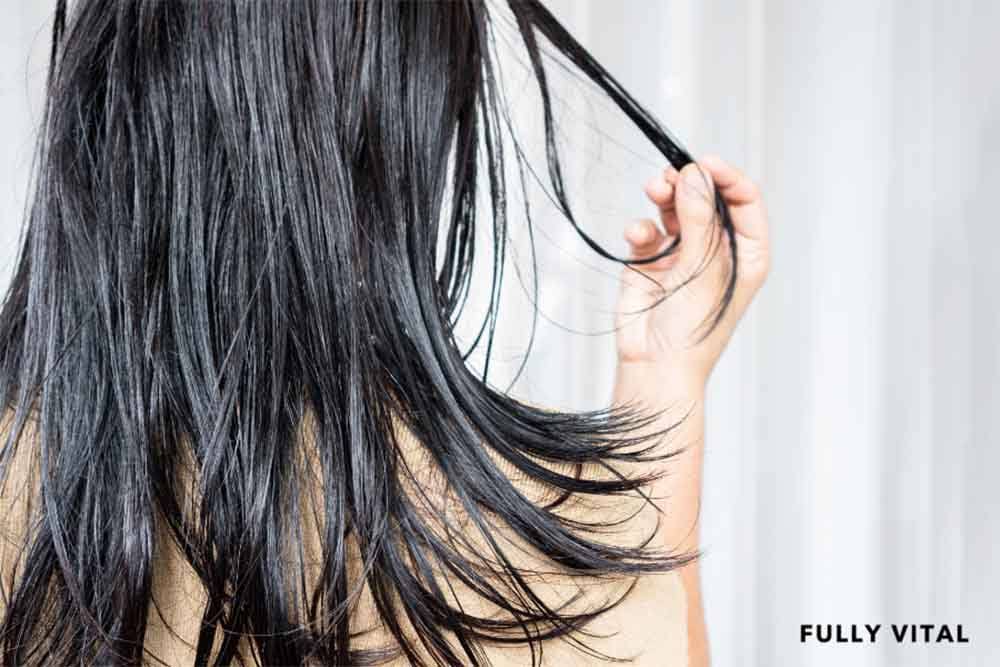
The Surprising Reasons Why Your Hair Is Oily And How To Fix It
If you find yourself constantly battling with greasy hair, you're not alone.
Many women struggle with oily hair, and it can be frustrating and difficult to manage.
But have you ever wondered why your hair gets oily in the first place?
Understanding the root causes of oily hair is the first step in finding effective solutions.
In this article, we'll explore the surprising reasons behind greasy hair and provide you with practical tips to tackle the issue.
So, say goodbye to oily hair woes and hello to healthier, more manageable locks!
Oily hair is often due to excessive sebum production by the scalp.
This can be caused by over-washing, which strips natural oils and prompts more sebum production.
Certain hair products might also increase oiliness.
Lifestyle factors like stress, hormonal changes, and poor diet can further affect sebum levels.
Understanding these causes is key to finding solutions for balanced, healthy hair.

I LOVE MY HAIR NOW
FullyVital hair serum and hair vitamins made tremendous improvements in my hair. I truly love my hair now.
Dorit S.,
Major Causes Of Increased Oil Production
Understanding the major causes of increased oil production can help you better address the issue of oily hair.
Here are some common factors that can contribute to excessive sebum production:
Overwashing
Washing your hair too frequently can strip away the natural oils, leading to an overproduction of sebum as your scalp tries to compensate.1
Aim to wash your hair every other day or every few days to maintain a healthy balance.
Harsh Hair Products
Certain hair care products, such as shampoos and conditioners, may contain ingredients that can irritate the scalp and trigger an increase in oil production.
Look for products labeled "oil-free" or "suitable for oily hair" to avoid exacerbating the issue.
Hormonal Changes
Hormonal fluctuations, such as those that occur during puberty, pregnancy, or menopause, can disrupt the oil balance on your scalp and contribute to oily hair.2
If you suspect hormonal imbalances, consult with a healthcare professional for further guidance.
Unhealthy Diet
Poor nutrition can impact the health of your hair and scalp, leading to increased oil production.
A diet high in processed foods and saturated fats can contribute to oily hair.
Opt for a balanced diet rich in fruits, vegetables, lean proteins, and healthy fats to support overall hair health.
Stress
Stress has a profound impact on our body, including our hair and scalp.
High stress levels can disrupt hormonal balance, leading to an increase in sebum production.
Engaging in stress management techniques, such as exercise, meditation, and relaxation techniques, can help reduce the impact of stress on your hair.

Hormonal Imbalances And Oily Hair
Hormonal imbalances are a key factor in excessive scalp oil production, often leading to oily hair.
This is especially common during puberty, pregnancy, and menopause due to significant hormonal changes.
If hormonal imbalances are suspected, consulting a healthcare professional for hormone level evaluation and treatment is advisable.
Addressing these imbalances, along with stress management and a healthy lifestyle, can improve hair health.
Treating the root cause, rather than just external symptoms, is essential for long-term management of oily hair.
The Impact Of Stress On Your Hair's Oil Content
Stress significantly affects our health, including increasing our hair's oiliness.
High stress levels lead to elevated cortisol, the stress hormone, which can disrupt hormonal balance and increase sebum production on the scalp.3
This excess sebum results in greasy, oily hair.
Stress not only directly stimulates oil production but also causes hormonal imbalances that exacerbate the issue.
To combat stress-related oily hair, incorporating stress management techniques into your daily life is crucial.
Regular exercise, meditation, deep breathing exercises, and relaxation activities can reduce stress levels, promoting hormonal balance and healthier hair.
Environmental Factors That Contribute To Oiliness
In addition to internal factors such as hormonal imbalances and lifestyle habits, environmental factors can also contribute to the oiliness of your hair.
It's important to take into account these external influences when trying to address and manage oily hair.
Here are some environmental factors that may contribute to excess oil production:
Humidity
High humidity levels can cause your hair to become frizzy and appear greasy.
When the air is humid, moisture in the air can penetrate the hair shaft, causing the hair to swell and become more susceptible to oil buildup.
To combat the effects of humidity, try using products that are specifically formulated to control excess oil and provide humidity protection.
Pollutants
Pollution in the environment can contribute to the oiliness of your hair.
Airborne pollutants, such as dust and smoke, can settle on your scalp and mix with sebum, leading to a greasy appearance.
To minimize the impact of pollutants on your hair, it's important to cleanse your hair and scalp regularly using gentle, clarifying shampoos that can effectively remove impurities.
Heat Styling
Excessive heat styling, such as blow-drying, straightening, or curling, can also lead to greasy hair.
Heat can stimulate the oil glands on the scalp, causing an increase in oil production.
Additionally, the use of heavy styling products and serums can also contribute to oiliness.
When using heat styling tools, it's important to use heat protectant products and avoid applying excessive styling products to the roots of your hair.
Over-brushing
Brushing your hair excessively or vigorously can stimulate the oil glands on your scalp, leading to increased oil production.
Opt for a gentle brush or comb to avoid overstimulating the oil glands and distributing the oils evenly throughout your hair.

Experience The Power Of Fully Vital Hair Growth ProductsAt Fully Vital, we understand the importance of a healthy relationship with your locks. That's why we have developed a range of hair growth products that are specifically designed to combat hair aging and give you the vibrant, luscious hair you've always dreamed of. Our scientifically-backed formulas are proven to slow down and even reverse the signs of hair aging, leaving you with stronger, thicker, and more youthful-looking hair. Key Features:
Benefits of Fully Vital Hair Growth Products:
Don't let hair aging hold you back. Experience the remarkable benefits of Fully Vital hair growth products and unlock the full potential of your hair! |
Final Thoughts On Embrace Healthy Hair Habits For Oily Hair Solutions
Dealing with oily hair can be frustrating, but understanding the reasons behind its occurrence is the first step towards finding effective solutions.
Whether it's hormonal imbalances, lifestyle habits, or external factors, addressing the root causes can help you manage and reduce oiliness, leading to healthier, more manageable locks.
By adopting a holistic approach to hair care, you can take charge of your oily hair and restore balance to your scalp and locks.
It starts with embracing healthy hair habits, such as avoiding over-washing, using gentle products suitable for oily hair, and maintaining a balanced diet.
Managing stress levels and seeking ways to relax and unwind can also have a positive impact on your hair's oil content.
When it comes to oily hair, it's important to remember that there is no one-size-fits-all solution.
What works for one person may not work for another.
It may require some trial and error to find the right combination of techniques and products that work best for your hair type and lifestyle.
At Fully Vital, we are committed to helping you on your journey towards healthier hair.
Our science-backed hair growth products are designed to slow down and reverse the aging of your hair, creating a more vibrant and resilient mane.
With our expertise and your dedication to nurturing your hair, oily locks will be a thing of the past.
So, embrace healthy hair habits, listen to your locks, and give your hair the care it deserves.
Say goodbye to greasy hair and hello to the confidence of beautiful, balanced tresses.
Frequently Asked Questions On Oily Hair
Why is my hair so oily?
Excessive oil production in the scalp is the main reason for oily hair.
When the sebaceous glands produce more oil than necessary, it can leave your hair looking greasy and weighed down.
What causes oily hair?
There are several factors that can contribute to oily hair.
These include hormonal imbalances, genetics, diet, stress, overwashing, certain hair products, and underlying medical conditions.
Is oily hair genetic?
Yes, the tendency to have oily hair can be influenced by genetics.
If your parents or close family members have oily hair, there's a higher chance that you may also experience it.
Does diet affect the oiliness of hair?
Yes, your diet can play a role in the oiliness of your hair.
Consuming a high-fat diet or greasy foods can lead to increased sebum production, which can contribute to oily hair.
Can stress make my hair oily?
Yes, stress can affect your hormone levels, including those that regulate oil production.
When you're under stress, your body may produce more oil, leading to oily hair.
Can overwashing my hair make it oily?
Yes, overwashing your hair can strip away its natural oils and cause your scalp to produce even more oil to compensate for the dryness.
It's important to find a balance and not wash your hair too frequently.
Why does my hair get oily so fast after washing?
If your hair gets oily quickly after washing, it could be due to several reasons.
Overwashing, using hot water, harsh shampoos, or conditioner buildup can all contribute to your scalp overcompensating with oil production.
Can certain hair products cause oiliness?
Yes, certain hair products like heavy oils, serums, or styling products can leave a residue on your scalp, leading to greasy hair.
It's essential to choose lightweight, oil-free, and non-comedogenic products that won't clog your hair follicles.
Are there medical conditions that can cause oily hair?
Yes, there are medical conditions that can contribute to oily hair, such as seborrheic dermatitis, hormonal imbalances, polycystic ovary syndrome (PCOS), and thyroid disorders.
If you suspect an underlying medical condition, it's best to consult with a healthcare professional for proper diagnosis and treatment.
Sources:
- Keller, E. (1999). Aromatherapy Handbook for Beauty, Hair, and Skin Care. In Google Books. Inner Traditions / Bear & Co. https://books.google.com/books?hl=en&lr=&id=nwhaXKc8eNsC&oi=fnd&pg=PR7&dq=Washing+your+hair+too+frequently+can+strip+away+the+natural+oils
- Roop, J. (2018). HORMONE IMBALANCE-A CAUSE FOR CONCERN IN WOMEN. https://doi.org/10.26479/2018.0402.18
- Russell, E., Koren, G., Rieder, M., & Van Uum, S. (2012). Hair cortisol as a biological marker of chronic stress: Current status, future directions and unanswered questions. Psychoneuroendocrinology, 37(5), 589–601. https://doi.org/10.1016/j.psyneuen.2011.09.009







